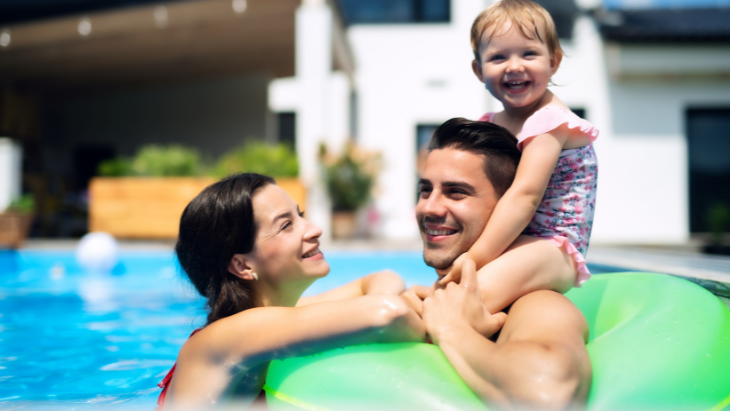3 Important Tips for Parents
Summer is not far away and with two-thirds of Australians now staying at home, the value
of having a backyard pool has never been more emphasised.
Being able to cool off with a plunge into the water is truly one of the greatest joys of warm
weather but bear in mind that a wonderful pool time also means being safe.
Remonda Martinez, CEO of Sydney’s largest pool builder Blue Haven Pools and Spas ,
recommends the top water safety tips to keep your kids happy and safe all summer long.
Place a Pool Barrier or Fence Around Your Pool
Proper fencing is a safety measure that is also a key requirement in getting an Occupation
Certificate of Compliance for your pool ,
Take a look at this checklist from Remonda to kick off your summer safely:
Make sure that the barrier’s gate is self-latching and self-closing with the latches out of a
child’s reach.
The gate should open outwards from the pool so it becomes impossible for children to
open it.
Check if there are no gaps under the fence that exceed 100mm.
Check the height of the latching mechanism. It should be 1500mm above the ground.
Ensure that your pool fences are 1200mm high measured from outside the fence, from the
ground level or any surface within 500mm of the fencing.
Relocate your fences like pots, furniture and fixed structures out of the climb zone.
If there is a Boundary Fence as a part of the enclosure, it must be 1800mm high and
completely free of climb points.
For a glass fence, you will need to provide a glazing certificate to the certifier to ensure the
right quality of glass has been used and is not likely to explode in the future.
There should be no doors or windows opening from the dwelling or other outbuildings
entering the pool area.
No vegetation or obstructions must be seen within a 900mm arc from the top of the
boundary fence within the pool area.
To know more about the do’s and don’ts of pool fencing, check out the Australian Pool
Safety Standards (AS1926.1 – 2012) .
Cover the Pool When Not in Use
To effectively use pool covers, make sure to cover the pool entirely with its anchors in the
pool deck securely attached.
Remonda also reminds removing the cover completely if you’re planning to use your pool,
whether for only a short period of time or otherwise. She advises using a rigid safety cover
(preferably a motorized one) whenever you’re not using it, and let pool technicians check
its effectiveness first before you let your kids head for a swim.
Some of the best options for pool covers are:
• Safety nets
• Mesh covers
• Automatic pool covers or vinyl pool covers – this will allow you to open or close the
cover with only a press of a button. Very convenient.
Please note: If your pool is above-ground , keep in mind that you need to remove the steps
and ladders when your pool is not in use aside from placing a pool cover.
Install Pool Alarms
Remonda encourages parents and homeowners to invest in a pool alarm as a second line
of defence to supplement a pool fence.
Having a pool alarm lets you easily detect if someone has entered your pool as it reacts to
any movement or waves in your pool water. You can opt for the type of alarm system that
shoots a beam around the pool area and sends an alarm once someone walks through it.
Water Safety Checklist
A parent herself, Remonda understands that keeping your kids safe is a year-round effort
that goes beyond enrolling them on learn-to-swim classes. On that note, she advises you
to strictly follow these universal guidelines:
• Always supervise your children whenever they’re in and around the pool. Don’t
leave them alone even if they know how to swim.
• Enrol them and yourself on swimming lessons especially those aged 1-4 years old.
• Learn CPR and other lifesaving skills and keep a first aid box in your house.
• Teach them pool safety rules and keep rescue equipment close to the pool.
• Always let them wear life jackets. Floating toys are not life jackets.
• Do not allow them to play breath-holding games in the water.
• Remind them to always enter the water with their feet first.
• Remind them to avoid pool drains and make sure you fix faulty drains immediately.
• Make your outlined pool rules eye-catching and place it near the pool area.
• Clearly mark the deep and shallow ends of your pool.
 Final Words
Final Words
In any situation, knowledge is power. By understanding and following these water safety
tips, you have all the means to ensure that your little swimmers can enjoy a wonderful and
safe plunge in your pools.






 Final Words
Final Words